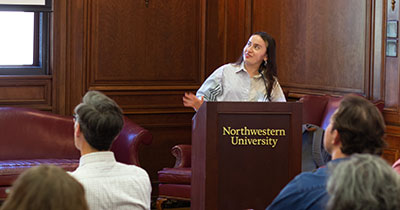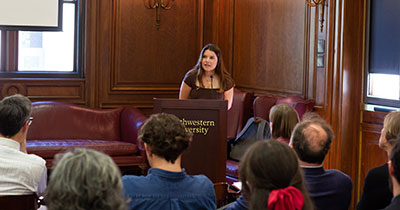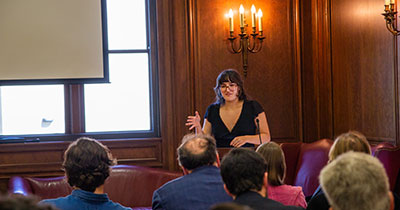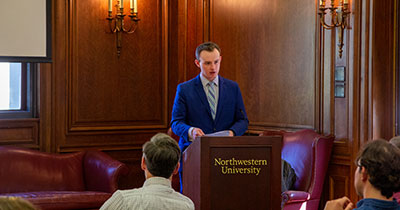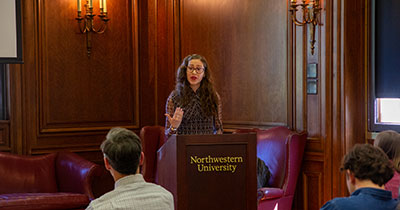Honors Thesis
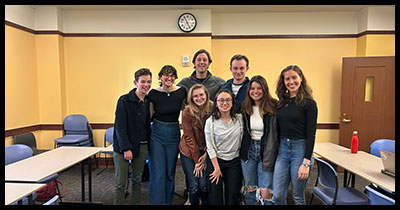
Historians in the Making: The Honors Thesis Experience
Introduction by Laurisa Sastoque
The History Senior Thesis Seminar at Northwestern University was one of the key highlights of my last year at Northwestern. Led by Prof. Keith Woodhouse, the seminar provided a one-of-a-kind space for intellectual growth, collaboration, and friendship. Every class, all of us got to know each other through Prof. Woodhouse’s creative icebreaker questions, such as “if you had to give up coffee, sugar, or your phone for a year, which one would you choose?” These activities not only fostered a sense of community within the seminar, but also provided us with humor and comfort before jumping into our academic agenda.
The seminar brought together a group of smart and passionate students, with a wide array of historical interests—from Ancient Egypt to the Vietnam War—but with a common interest in helping each other grow. Through a series of workshops, peer reviews, guest speakers, and support sessions, we watched each other go through the process of creating what for most of us has been the biggest academic undertaking of our lives.
While the sheer magnitude of the project at times felt overwhelming, the unwavering support and encouragement from both peers and advisors kept us motivated. Through peer reviews and live discussions about our chapters, we crafted compelling narratives and arguments that reflected our aims as researchers.
As all of us gathered for dinner the evening after turning in our thesis, we reflected on our achievements and shared our future aspirations. That night I felt honored to have shared a classroom with individuals who aspire to become historians, storytellers, and changemakers.
I can already see that the History Senior Thesis Seminar will leave a lasting impact on our academic and personal trajectories. I believe I speak for all of my peers in saying that we would highly recommend this experience to future senior History majors, so that they can also challenge themselves to expand their passion for research.
View the Gallery
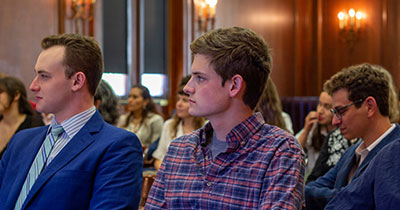
All photos are taken from Honors Thesis Symposium in Harris 108 / May 25, 2023
In Their Own Words:
Griffin Harris -“In Washington's Shadow: Race, Class, and Neighborhood in Postwar Alexandria, Virginia”
Alexandria, Virginia, just across the Potomac River from the nation’s capital, was the setting for a collision of racial attitudes in the 1950s and 1960s, a history that both deepens and challenges prevailing scholarly interpretations about the rise of the suburban United States.
Carolina Stutz - “The 'Mass' in Mass Migration: Italian Immigrant Crowdedness in Late 19th and Early 20th Century Argentina”
Carolina's thesis is about the mass migration of working-class Italian immigrants to Argentina in the late 19th and early 20th centuries, and specifically how their experiences of crowdedness onboard the ship and then in Buenos Aires fundamentally shaped the way these migrants related to each other.
James Esperne - “An Institutional Battle: France’s Plan XVII and the Doctrine of the Offensive, 1870-1914”
The story of the institutional and political factors which led to the downfall of the first French offensives in 1914, part of a greater historical trend of tension between the military and the government in liberal democracies.
Samuel Rosner - “A Historian’s Guide for the Perplexed: Heinrich Graetz and the Hegelian Turn of Wissenschaft des Judentums to the Maimonidean Controversy”
This thesis examines how Heinrich Graetz and other Wissenschaft des Judentums scholars appropriated Hegelian philosophy of history to conceive of the Maimonidean Controversy as a dialectical episode capable of intense political and messianic potential.
Valeria Lira-Ruelas - “Disorder in America: National Responses to the Long, Hot Summer of 1967”
My thesis studies national responses to the civil disorders of the Long, Hot Summer of 1967 and argues that a moment that has been remembered as deeply polarizing, resulting in intense backlash and a shift rightward in American politics, was actually far from it.
Laurisa Sastoque - “Not All Colombians Deal Drugs: Immigration, Community Organizing and Stigmatization during the War on Drugs in the United States 1965-1991”
The story of how the Colombian diaspora in the United States responded to media and society's stigmatization during the rise of the Colombian international drug trade in the late 20th century through strategies of identity-formation and community-organizing.
Sara Gronich - “Here, There, and Everywhere: How the Vietnam War Undermined the American Frontier Myth”
My thesis argues that Americans popularly conceptualized their foreign relations through western frontier spatiality until the Vietnam War undermined that spatiality and pointed to a new way for Americans to imagine their spatial relations with the rest of the world.
Hayley Wallenfeldt - “Dress, Identity, and the Foreign in 18th Dynasty Egypt”
This thesis addresses the culture exchange between 18th Dynasty Egyptian elites and their neighbors through the lenses of dress and textiles utilizing remaining garments, documents, and painted depictions yet to be compiled together.





